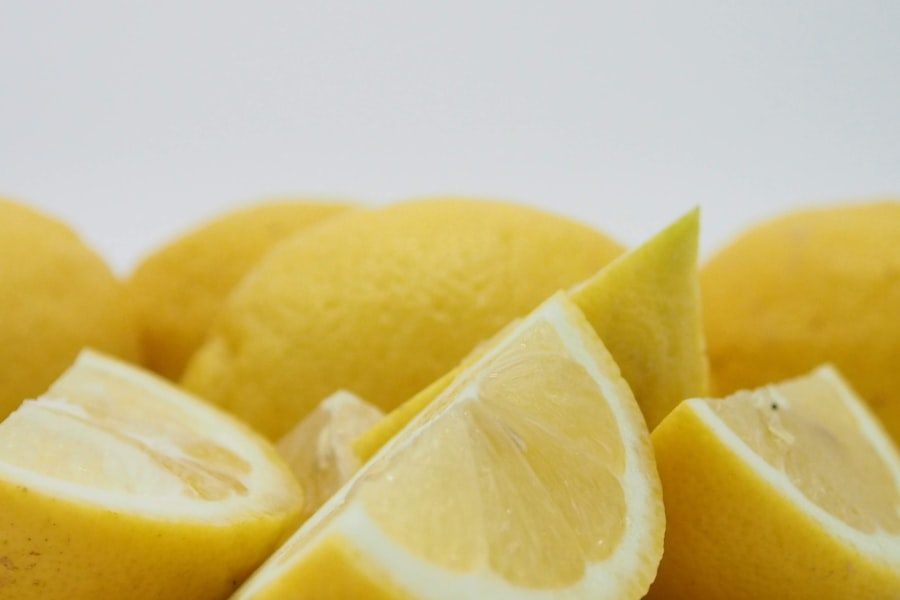
Lemon powder is a versatile ingredient that has gained popularity in recent years for its ability to add a burst of citrus flavor to a variety of dishes. It is made by dehydrating and grinding lemons into a fine powder, which can then be used as a seasoning, flavoring, or garnish. Lemon powder has a long history and has been used in various cuisines around the world.
The process of making lemon powder dates back centuries, with ancient civilizations using various methods to preserve lemons for extended periods. The drying process not only preserved the lemons but also concentrated their flavor, making them a valuable ingredient in cooking and baking. Today, lemon powder is widely available in stores and can also be made at home using fresh lemons.
Lemon powder is an essential ingredient in many recipes due to its ability to enhance the flavor of dishes. It adds a tangy and refreshing taste that can brighten up both sweet and savory dishes. Whether used as a seasoning for roasted vegetables, a flavoring for desserts, or a garnish for cocktails, lemon powder adds a unique and vibrant element to any dish.
Key Takeaways
- Lemon powder is a versatile ingredient for cooking and baking.
- Using lemon powder can provide health and wellness benefits.
- Making your own lemon powder at home is easy with a DIY guide.
- Lemon powder can be used in a variety of ways in cooking and baking.
- Lemon powder is a delicious and healthy alternative to salt.
The Benefits of Using Lemon Powder for Your Health and Wellness
Lemon powder not only adds flavor to your dishes but also offers several health benefits. It is packed with essential nutrients and antioxidants that can support your overall health and wellness.
Lemon powder is rich in vitamin C, which is known for its immune-boosting properties. Vitamin C helps strengthen the immune system, fight off infections, and promote healthy skin. It also acts as an antioxidant, protecting the body against free radicals that can cause damage to cells.
In addition to vitamin C, lemon powder contains other vitamins and minerals such as vitamin B6, potassium, and magnesium. These nutrients play a vital role in maintaining proper bodily functions and promoting overall health.
When compared to fresh lemons, lemon powder offers several advantages. It has a longer shelf life, making it a convenient option for those who want to have lemon flavor on hand at all times. Lemon powder is also more concentrated in flavor, allowing you to use less of it in recipes while still achieving the desired taste.
How to Make Your Own Lemon Powder at Home: A DIY Guide
Making your own lemon powder at home is a simple and cost-effective way to enjoy the benefits of this versatile ingredient. Here is a step-by-step guide to making lemon powder:
Ingredients needed:
– Fresh lemons
– Knife or citrus zester
– Dehydrator or oven
– Blender or spice grinder
Step 1: Wash and dry the lemons thoroughly to remove any dirt or residue.
Step 2: Using a knife or citrus zester, remove the zest from the lemons. Be careful not to include the white pith, as it can add a bitter taste to the powder.
Step 3: Spread the lemon zest in a single layer on a dehydrator tray or baking sheet lined with parchment paper.
Step 4: If using a dehydrator, set it to the lowest temperature and let the lemon zest dry for 8-12 hours, or until it becomes brittle. If using an oven, preheat it to the lowest temperature and place the baking sheet with the lemon zest inside. Leave the oven door slightly open to allow moisture to escape. Check on the zest regularly and remove it once it is dry and brittle.
Step 5: Once the lemon zest is completely dry, transfer it to a blender or spice grinder. Pulse until it becomes a fine powder.
Step 6: Store the lemon powder in an airtight container in a cool, dry place. It can be kept for several months.
Tips for storing lemon powder:
– Store in an airtight container to prevent moisture from entering and causing clumping.
– Keep in a cool, dry place away from direct sunlight.
– Label the container with the date of preparation to ensure freshness.
The Different Ways to Use Lemon Powder in Your Cooking and Baking
| Ways to Use Lemon Powder | Description |
|---|---|
| As a seasoning | Sprinkle lemon powder on fish, chicken, vegetables, or popcorn for a tangy flavor. |
| In marinades | Add lemon powder to marinades for meat or vegetables to infuse them with a citrusy taste. |
| In baked goods | Use lemon powder in cakes, cookies, and other baked goods for a bright, lemony flavor. |
| In salad dressings | Whisk lemon powder into salad dressings for a zesty kick. |
| In beverages | Add lemon powder to water, tea, or cocktails for a refreshing twist. |
Lemon powder can be used in a variety of ways to add a burst of citrus flavor to your cooking and baking. Here are some ideas on how to incorporate lemon powder into your recipes:
1. Using lemon powder as a seasoning: Sprinkle lemon powder over roasted vegetables, grilled meats, or seafood for a tangy and refreshing flavor. It can also be used as a seasoning for popcorn, potato chips, or roasted nuts.
2. Incorporating lemon powder in marinades and dressings: Add lemon powder to marinades for meats or seafood to infuse them with a bright and zesty flavor. It can also be used in salad dressings to add a tangy kick.
3. Adding lemon powder to desserts: Use lemon powder in cakes, cupcakes, cookies, or biscuits to give them a citrusy twist. It can also be added to frostings, glazes, or icings for an extra burst of flavor.
4. Using lemon powder in beverages: Stir lemon powder into tea or coffee for a refreshing and tangy twist. It can also be added to smoothies or juices for a burst of citrus flavor.
5. Enhancing the flavor of savory dishes with lemon powder: Add lemon powder to soups, stews, or sauces to brighten up their flavors. It can also be used as a seasoning for rice, quinoa, or pasta dishes.
Lemon Powder: A Delicious and Healthy Alternative to Salt
Lemon powder can be a delicious and healthy alternative to salt in your recipes. Here are some reasons why you should consider using lemon powder instead of salt:
1. Comparison of lemon powder with salt: Lemon powder offers a tangy and citrusy flavor, while salt adds a savory and salty taste. Both ingredients can enhance the flavor of dishes, but lemon powder provides a unique and refreshing twist.
2. Benefits of using lemon powder instead of salt: Lemon powder is low in sodium, making it a healthier option for those watching their salt intake. It also contains essential nutrients and antioxidants that can support your overall health.
3. Tips for using lemon powder as a salt substitute: When using lemon powder as a salt substitute, start with a small amount and adjust to taste. Lemon powder is more concentrated in flavor than salt, so you may need less of it to achieve the desired taste. Experiment with different recipes to find the perfect balance of flavors.
Lemon Powder in Beverages: Adding Flavor and Zest to Your Drinks

Lemon powder can be a versatile ingredient in beverages, adding flavor and zest to your drinks. Here are some ways to use lemon powder in your favorite beverages:
1. Using lemon powder in tea and coffee: Stir a teaspoon of lemon powder into your cup of tea or coffee for a refreshing and tangy twist. It can complement both black and herbal teas, as well as hot or iced coffee.
2. Adding lemon powder to smoothies and juices: Blend lemon powder into your favorite smoothie or juice recipe for an extra burst of citrus flavor. It pairs well with fruits such as berries, pineapple, or mango.
3. Creating lemon-flavored cocktails with lemon powder: Sprinkle lemon powder on the rim of your cocktail glass for a zesty garnish. It can also be added to cocktails such as margaritas, mojitos, or vodka sodas for a refreshing twist.
Lemon Powder in Desserts: Elevating the Taste of Your Sweet Treats
Lemon powder can take your desserts to the next level by adding a burst of citrus flavor. Here are some ways to use lemon powder in your sweet treats:
1. Using lemon powder in cakes and cupcakes: Add a teaspoon or two of lemon powder to your cake or cupcake batter for a tangy and refreshing flavor. It pairs well with flavors such as vanilla, coconut, or blueberry.
2. Adding lemon powder to cookies and biscuits: Incorporate lemon powder into your cookie or biscuit dough for a citrusy twist. It can complement flavors such as white chocolate, ginger, or lavender.
3. Creating lemon-flavored frosting and glazes with lemon powder: Mix lemon powder into your frosting or glaze recipe to add a tangy kick. It can be used in buttercream frosting, cream cheese frosting, or a simple powdered sugar glaze.
Lemon Powder in Savory Dishes: Enhancing the Flavor of Your Meals
Lemon powder can enhance the flavor of savory dishes, adding a bright and tangy element to your meals. Here are some ways to use lemon powder in savory dishes:
1. Using lemon powder in soups and stews: Add a teaspoon of lemon powder to your soup or stew for a burst of citrus flavor. It pairs well with chicken, vegetable, or seafood-based soups.
2. Adding lemon powder to roasted vegetables and meats: Sprinkle lemon powder over roasted vegetables or meats before cooking for a tangy and refreshing flavor. It pairs well with vegetables such as asparagus, broccoli, or Brussels sprouts.
3. Creating lemon-flavored sauces and gravies with lemon powder: Mix lemon powder into your sauce or gravy recipe to add a bright and tangy kick. It can be used in pasta sauces, pan sauces, or gravies for meats.
Lemon Powder in Marinades and Dressings: Creating Delicious and Tangy Sauces
Lemon powder can be a versatile ingredient in marinades and dressings, creating delicious and tangy sauces. Here are some ways to use lemon powder in marinades and dressings:
1. Using lemon powder in salad dressings: Mix lemon powder into your favorite salad dressing recipe for a tangy and refreshing flavor. It pairs well with vinaigrettes, creamy dressings, or citrus-based dressings.
2. Adding lemon powder to marinades for meats and seafood: Incorporate lemon powder into your marinade recipe to infuse meats or seafood with a bright and zesty flavor. It pairs well with chicken, fish, shrimp, or tofu.
3. Creating tangy dipping sauces with lemon powder: Mix lemon powder into mayonnaise, yogurt, or sour cream to create a tangy dipping sauce. It can be used for vegetables, chicken tenders, or seafood.
Embrace the Flavorful World of Lemon Powder and Zest Up Your Life
In conclusion, lemon powder is a versatile ingredient that can add a burst of citrus flavor to your cooking and baking. It offers several health benefits and can be made at home using fresh lemons. Lemon powder can be used in a variety of ways, from seasoning savory dishes to enhancing the flavor of desserts and beverages.
By embracing the flavorful world of lemon powder, you can add a unique and refreshing twist to your favorite recipes. Whether you’re looking to elevate the taste of your meals or create delicious and tangy sauces, lemon powder is a must-have ingredient in your kitchen. So go ahead, zest up your life with the vibrant and delicious flavors of lemon powder!
If you’re a fan of lemon powder, you’ll definitely want to check out this article on Flavorful Sips that decodes the delights of orange drinks. It explores the various ways you can enjoy the refreshing taste of oranges in your beverages. From orange-infused cocktails to homemade orange sodas, this article has got you covered. So, if you’re looking to expand your citrus horizons beyond lemon powder, click here to discover the wonders of orange drinks: https://flavorfulsips.com/decoding-the-delights-of-orange-drinks/.



